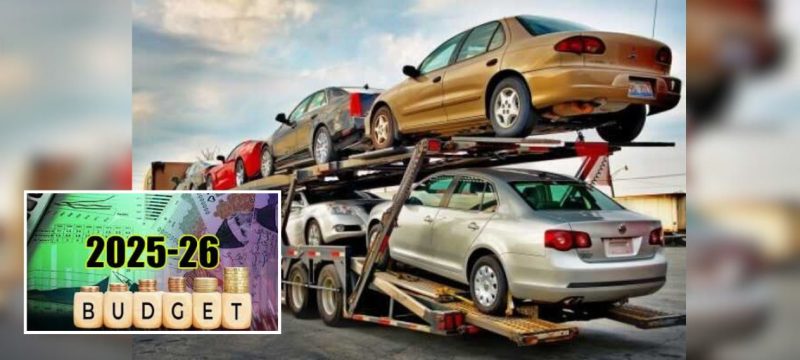The federal government is preparing to present the national budget for the fiscal year 2025-26 on June 2, with a major emphasis on revamping policies related to car imports.
According to sources reported by News Guru, consumers may receive significant relief, as the prices of imported vehicles — particularly new models — are expected to decrease under the upcoming budget. This initiative follows continuous pressure from the International Monetary Fund (IMF), which has been urging Pakistan to reduce import-related taxes, especially in the auto sector, to foster market competitiveness and transparency.
Read more: Ministry of Health Proposes 20% Health Tax on Bakery and Confectionery Items in 2025-26 Budget
Senior Federal Board of Revenue (FBR) officials revealed that the IMF has specifically called for the reduction of steep tariffs on imported cars and for liberalizing the commercial import system. The IMF believes that such measures would not only enhance transparency but also help curb over-invoicing and the misuse of gift schemes frequently used to import used cars.
Proposed Measures Under Discussion:
FBR insiders disclosed that several proposals are being evaluated to adjust customs duties on imported cars. One of the key proposals involves slashing import duties by 5% to 30% on brand-new vehicles, including:
- Small cars with engines up to 850cc
- Mid-sized and large cars with engines up to 1801cc
Currently, these vehicles are subject to duties ranging from 50% to 100%, depending on engine size and category. If implemented, the proposed reductions would be among the largest in recent years and could significantly impact Pakistan’s auto industry, which is largely controlled by a few domestic manufacturers operating under heavy protection.
However, the same relief may not extend to used vehicles. Officials mentioned that the government intends to maintain higher customs duties on used cars to limit grey market activity and shield local manufacturers from excessive competition.
Policy Shift on Used Vehicles:
The FBR is also reviewing a proposal to increase the allowable age for importing used cars from the current limit of three years to five years. There is even consideration for gradually expanding the limit to ten years. This move could offer consumers more affordable second-hand options in the long run.
These reforms are part of a wider effort to lower vehicle prices, which have surged due to high tariffs, the depreciation of the Pakistani rupee, and strict import controls.
Support for Electric Vehicles:
The new budget is also expected to reinforce the government’s support for electric vehicles (EVs) as outlined in the 2019 National Electric Vehicle Policy. Potential incentives include tax breaks for importing and locally assembling EVs and their components. The Energy Ministry and the Ministry of Industries have backed this initiative, seeing it as a way to reduce dependency on fossil fuels and tackle air pollution.
Industry Pushback and Consumer Relief:
While the proposed reforms may favor car buyers, they could face opposition from local auto manufacturers, who have long benefited from high import barriers. These manufacturers argue that reducing import duties might disrupt local production and lead to job losses. Conversely, consumer advocates and economists believe that increasing competition through imports will enhance product quality and reduce costs in a market known for limited choices and delivery delays.
A senior official involved in budget planning told News Guru that the auto sector is being reconsidered from a taxation perspective. He confirmed that the IMF’s recommendations align with broader economic reform goals to reduce monopolistic practices and open up the market. Final decisions will be made in consultation with stakeholders from the automotive industry, commerce ministry, and international partners before the budget announcement.









